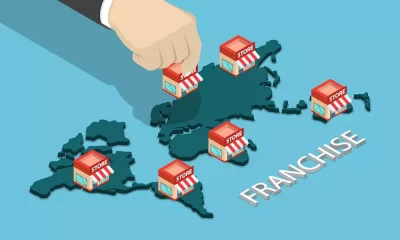Mindset
Seven Words a Business Owner Can Never Afford to Use
Which of these words are you using to run your business? Here’s a way to remember them – “Try” to strike them from your vocabulary, “but” if you “can’t”, you can “settle” for only using a few and make a “goal” of getting rid of the rest “later”, when you’re “alone” and nobody’s watching.

- Try (the uncommitted’s word)
“We’re going to try to…”
Yoda – “Try not. Do, or do not. There is no try.” Intentionality is a huge key to getting where you want to go. When a business owner uses “try”, their escape route is clearly identified, and they have no intention of seeing things through, especially in the rough times. Great business owners don’t try, they do. - But (the victim’s word)
“This could have worked, but outside forces kept us from…”, or “But I don’t know how…”“But” is the victomology word for business owners. It keeps us from figuring things out and pushing through to victory. Great business owners don’t use “but”. They make lemonade with every lemon they’re given. - Can’t (the unbeliever’s word)
We “tried”, but we “can’t”…Vision is critical. If you don’t have clarity about where you’re going, you won’t believe you can get there. Great business owners are too busy getting where they’re going to give in to “can’t”. They’ll figure it out. - Settle [for] (the unmotivated’s word)
“Good enough.” Great business owners don’t settle. What was the passion that brought you into business in the first place? Why would you allow circumstances to change your commitment to that passion?Circumstances don’t make us who we are. Our responses do. - Goals (the heroic activist’s word)
I have only one set of goals – my Lifetime Goals (things I can never check off as completed). I have no goals for my business, only objectives and waypoints. My business exists to serve me in getting to my Lifetime Goals, so each month, quarter, and year I set objectives and waypoints in my business to use my business to get there. This keeps me from having false victories by beating a quarterly or annual “goal” and or false defeats by not having achieved them. They are merely milestones or waypoints along the way to my Lifetime Goals.Great business owners don’t get hung up on intermediary milestones – they are completely focused on getting to the end game, their only set of goals, the ones they can never check off – Lifetime Goals.Conation – the will to succeed that manifests itself in single-minded pursuit of the goal. - Later (the thinker’s word)
Bad plans carried out violently many times yield good results. Do something. The #1 indicator of success in early stage businesses is not how great your plan is, or how smart you are, or how much research you’ve done. The #1 indicator of success is Speed of Execution. Later never comes.Three things changes us when we do them:
a) Make a decision
b) Put a date on it
c) Go PublicGreat business owners get an idea, move on it, and figure it out as they go, and they understand the value of going public with their intentions. - Alone (the “Rugged Individualist’s [proud loner’s] word)
Everything we do in life, from taking a spouse to joining a bicycling club has the element of “community” in it, except for business ownership. Good luck with that one, you’re on your own.There isn’t another place in society other than business ownership, where we have fully institutionalized the nonsense myth of the rugged individualist. A friend of mine did a study on leadership and found that the single biggest indicator of success or failure was whether the leader had people close to them who the leader gave the authority and permission to call them on their actions. John Wayne is dead. We should have buried the rugged individualist with him.Great business owners have Outside Eyes on their business all the time.
Which of these words are you using to run your business? Here’s a way to remember them – “Try” to strike them from your vocabulary, “but” if you “can’t”, you can “settle” for only using a few and make a “goal” of getting rid of the rest “later”, when you’re “alone” and nobody’s watching.Why the name? I’ve come to the conviction that it is normal that any business could be grown from inception to maturity in 3to5 years (investors always want their money back in 3to5), 2 to 7 in the best and worst of circumstances. That doesn’t mean you have to pick something in that range. But if you go out 9, 12, 15 years, I believe the bar isn’t high enough to create the urgency you need to be intentional every day about growing your business. It will be too easy to lapse back into making money, a deadly trap. Be ambitiously lazy, get done quicker.
I believe by using the one motivator and two bosses we talked about last week, that it is quite possible my business will be at Maturity before Friday, February 18, 2011, 10am. But what if I miss that date? How do I deal with the fear I might fail? The head starts spinning. We’ll talk about this next week, and the week after we’ll deal with the hostage comment I made at the beginning of this blog.
Are you in? Will you join me in becoming charter members of the 3to5Club? We’ll do a website and all that crap later. Let’s get started. I’ve set up a meetup.com group for Denver (http://www.meetup.com/3to5Club/), and we’re going to have a charter meeting on Thursday, March 27 at 11:30pm at PanAsia Bistro in Lone Tree, CO. I would be happy to help you set up 3to5Club in your city as well – just leave me a comment.
I’d love to be the first graduate of the 3to5Club in 1 year, 11 months and two weeks from now, but I’m sure there will be a lot of people who will beat me to it. I hope so.
What’s your Business Maturity Date? What does your business look like that day, at that hour? Go public right here in the comments section and let’s take it from there. Speed of execution. I’m looking forward to “executing” that locomotive as quickly.






